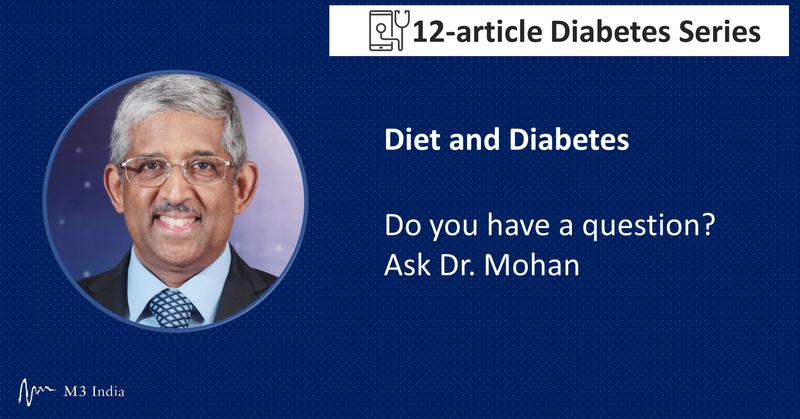Exclusive 12-article Diabetes series: Diet and Diabetes: Dr. V Mohan
M3 India Newsdesk Dec 05, 2019
Dr. V Mohan writes that while there is no 'one size fits all' approach to preventing and controlling DM, educating diabetic and pre-diabetic patients on food groups, GI, and nutritional value of sweeteners can help them make smart diet decisions.

Through the ages diet has always remained a controversial issue. Diet is also something which people are very passionate about and in some ways very difficult to change because as the saying goes ‘old habits die hard’. If one thinks about it, there cannot be a single ‘best diet’ to prevent and control diabetes. It is well known that excessive calories particularly in the form of carbohydrates lead to obesity and to type 2 diabetes. Hence for prevention of diabetes, particularly in those who are at high risk, eg. those who have a strong family history of diabetes,
- it is important to cut down the calories especially the carbohydrates and substitute this with proteins preferably from plant proteins like bengal gram, green gram, black gram, soya, mushroom and from milk and egg white
- it is also important to include healthy fats (mono unsaturated fats) which come from oils like groundnut oil, mustard oil, canola, gingelly oil, etc and also from nuts and seeds
If one is able to cut down the rice and chapathi quantity and increase the intake of green leafy vegetables, the risk for obesity, type 2 diabetes and heart disease can be cut down considerably. In order to prevent hunger, one can include salads, vegetables, dilute soups, buttermilk, lime juice, tomato juice and other low calorie items.
We have shown through our studies, particularly the 'D-CLIP study' that in people with pre diabetes, by a little alteration of their diet, increasing their physical exercise and a very modest weight loss (of just 5% in weight), diabetes could be prevented in upto 35% of people with prediabetes.
What about those who already have diabetes?
In those who have diabetes, it is particularly important to control the intake of carbohydrates and follow the same principles which are outlined above. In addition, of course, free sugar intake in the form of sugar, honey, excessively sweet fruits like mango and sweetened beverages should be cut down. Again the protein content of the diet must be increased.
It is better to avoid extreme diets which keep circulating in society from time to time almost like a seasonal variation. I refer to fad diets like Keto diet, Atkins diet, Paleo diet and other extreme forms of diet. Most of these fad diets advocate cutting off of one of the food components completely, eg. zero carbohydrate, if one does this, one will end up taking 70 – 80% fat which is also very bad for health. Similarly, if one makes it a zero fat diet, then one will end up with 80% of carbohydrate which is also not good.
The best diet would consist of about 40-50% carbohydrates, 20-25% of protein and the rest from healthy fats. If one does this, one can still lose weight, control diabetes and prevent heart disease and even some forms of cancer.
What about alcohol?
Alcohol provides empty calories with no nutrients. Hence it is better to avoid or restrict intake to 1 or 2 small drinks, two or three times a week.
What about artificial sweeteners?
Non-caloric sweeteners like sucralose (or stevia) can be taken safely. Nutritive sweeteners (eg, fructose based huge calories) are best avoided.
Glycaemic index of foods
There are some foods which have a very high glycemic index. Such foods will increase blood glucose levels. Hence it is better to have foods with lower glycaemic index, such as, brown rice or brown bread will have lower glycaemic index than white rice or white bread.
Fruits
Fruits can be consumed by people with diabetes after their sugar is controlled. Apple, papaya and guava are some of the fruits which can be consumed.
Non-vegetarian items
For non vegetarians, fish, chicken and white of the egg are preferred. Red meat is best avoided.
Remember, fasting and feasting are not recommended for people with diabetes. Eating small frequent feeds will help to prevent excessive sugars in post prandial glucose levels. At the end of the day, it is all about moderation. A healthy diet can help people live long and healthy lives.
In summary, there is no one single diet suitable for people with diabetes. In other words, there is no ‘one size fits all’. One has to adapt one’s diet sensibly to include healthy foods and maintain such a diet for years to come. This is the secret of preventing and controlling diabetes.
To read articles published in the series, click,
Treatment algorithm; factors to consider while prescribing medication: Dr. V Mohan
Diabetes Q&A with Dr. V Mohan: Treatment algorithm for DM
Managing hypertension in diabetic patients: Dr. V Mohan
Diabetes Q&A with Dr. V Mohan: Managing hypertension in diabetic patients
Being a part of this exclusive series allows you to post a question for Dr. V Mohan. Answers will be pubished along with the next article in this monthly series.
Disclaimer- The views and opinions expressed in this article are those of the author's and do not necessarily reflect the official policy or position of M3 India.
The author, Dr. V Mohan is the Chairman & Chief of Diabetology at Dr. Mohan’s Diabetes Specialities Centre & Madras Diabetes Research Foundation, Chennai, India.
-
Exclusive Write-ups & Webinars by KOLs
-
Daily Quiz by specialty
-
Paid Market Research Surveys
-
Case discussions, News & Journals' summaries